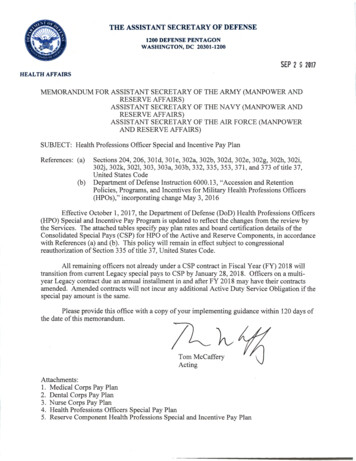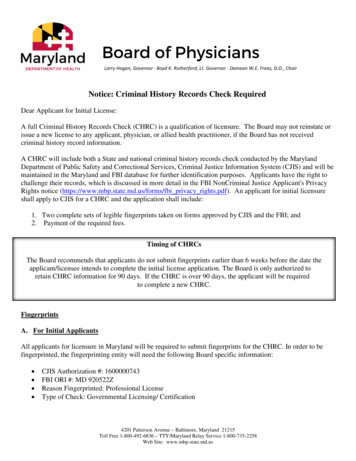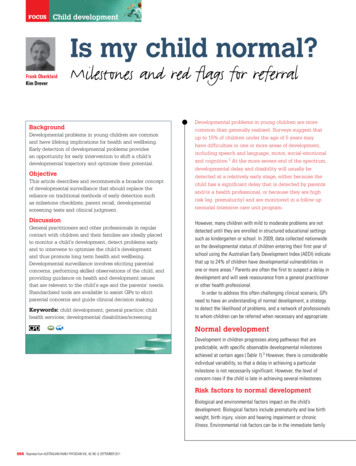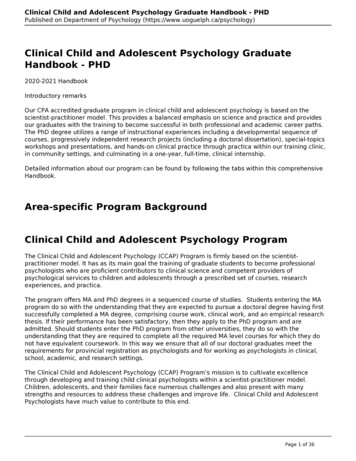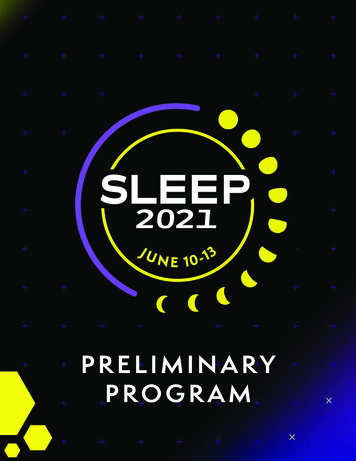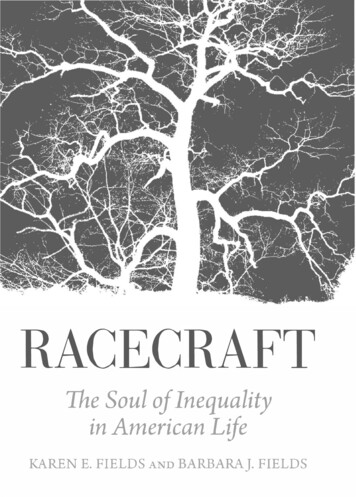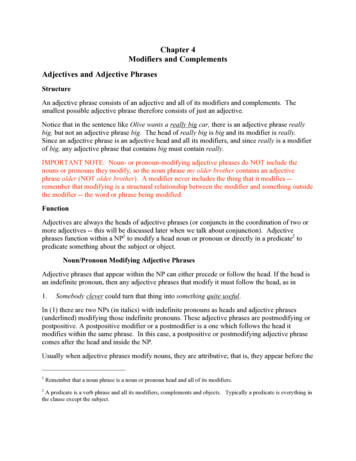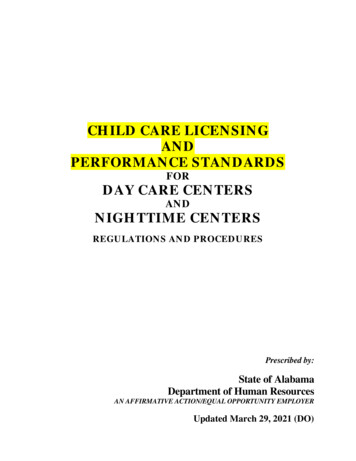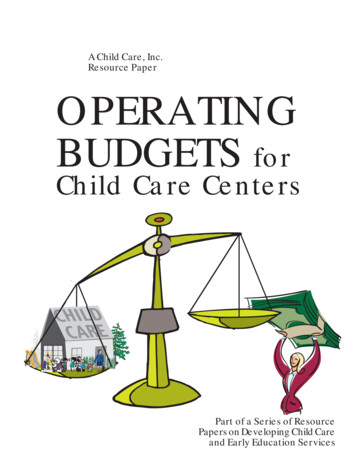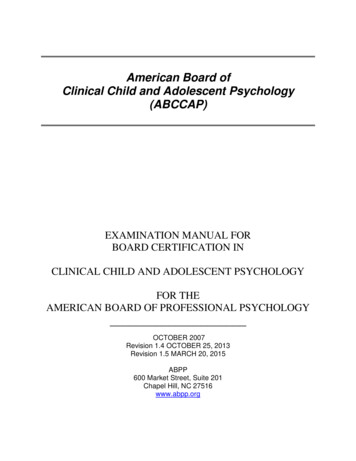
Transcription
American Board ofClinical Child and Adolescent Psychology(ABCCAP)EXAMINATION MANUAL FORBOARD CERTIFICATION INCLINICAL CHILD AND ADOLESCENT PSYCHOLOGYFOR THEAMERICAN BOARD OF PROFESSIONAL PSYCHOLOGYOCTOBER 2007Revision 1.4 OCTOBER 25, 2013Revision 1.5 MARCH 20, 2015ABPP600 Market Street, Suite 201Chapel Hill, NC 27516www.abpp.org
ABCCAP Exam Manual2
ABCCAP Exam ManualTABLE OF CONTENTSIINTRODUCTIONCERTIFICATION PROCESS: BRIEF OVERVIEWIISTAGE 1: ELIGIBILITY FOR CANDIDACY AND SPECIALTYSPECIFIC REQUIREMENTS5GENERIC DEGREE AND PROGRAM REQUIREMENTSLICENSURE/CERTIFICATION REQUIREMENTSSPECIALTY SPECIFIC PROGRAM REQUIREMENTSINTERNSHIP REQUIREMENTSPOSTDOCTORAL PRACTICE EXPERIENCE ANDSUPERVISION REQUIREMENTSSENIOR PSYCHOLOGIST OPTIONIIIDEFINITION OF CLINICAL CHILD AND ADOLESCENTPSYCHOLOGYSERVICESCOMPETENCIES CHARACTERISTIC OF THE SPECIALTYOF CLINICAL CHILD AND ADOLESCENT PSYCHOLOGYIVAPPLICATION PROCESSDISABILITY ACCOMMODATIONSAPPLICATIONVSTAGE 2: PRACTICE SAMPLECURRICULUM VITAEPROFESSIONAL STATEMENTREQUIRED FORMSREGULAR OPTION PRACTICE SAMPLESSENIOR OPTION PRACTICE SAMPLESVI44STAGE 3: ORAL EXAMINATIONSCHEDULINGCANDIDATE’S MATERIALSSCHEDULE SUMMARYSCHEDULE SUMMARY TABLEETHICS VIGNETTES5666788891111111414141515161717171718193
ABCCAP Exam ManualVIIABCCAP EXAMINATION TEAMTEAM COMPOSITIONVIII SCORING CRITERIACOMPETENCY AREASSCORING CRITERIA FOR THE COMPETENCIESCRITERION EXAMPLES OF COMPETENCIESIXFINAL EXAMINATION PROCEDURES ANDCANDIDATE NOTIFICATIONEXAMINATION RESULTSEXAMINATION FEEDBACKXAPPENDICES – FORMS A – JForm A Steps in the ABCCAP Board-Certification ProcessForm B Specialty-Specific Credential Review Result FormForm C-1 Regular Option Practice Sample ChecklistForm C-2 Assessment Practice SampleForm C-3 Intervention Practice SampleForm C-4 Consultation Practice SampleForm C-5 Supervision or Management Practice SampleForm C-6 Senior Practice Sample OptionForm D Professional StatementForm E Voluntary Consent AgreementForm H-1 Candidate Appeal GuideForm I Qualifications for Testing AccommodationsForm J Testing Accommodations 94042444
ABCCAP Exam Manual5I. INTRODUCTIONThe American Board of Clinical Child and Adolescent Psychology (ABCCAP) is a memberSpecialty Board of the American Board of Professional Psychology (ABPP). The examination inClinical Child and Adolescent Psychology, for board certification by ABCCAP, certifies that thesuccessful candidate has completed the educational, training, and experience requirements of thespecialty, including a performance examination designed to assess the competencies required toprovide quality services in the specialty of Clinical Child and Adolescent Psychology.The primary objective of the ABCCAP is to establish a board certification process thatrecognizes, certifies, and promotes specialty level standing in the field of Clinical Child andAdolescent Psychology. Specialty level standing is conceptualized as higher than the basic levelof competence certified by jurisdictional licensure, but within the reach of most experiencedpractitioners of professional psychology.The ABCCAP expects that most Clinical Child and Adolescent psychologists should qualifyfor board certification following three years of post-doctoral training or equivalentexperience.Board Certification by ABCCAP assures the public that the individual has successfullycompleted the educational, training, and experience criteria of the specialty of Clinical Child andAdolescent Psychology, including an examination designed to assess the nine areas ofcompetence (five functional competencies and four foundational competencies) stipulated in thismanual that are required to provide specialty level practice.Functioning at the Board Certified level reveals a quality of advanced preparation andprofessional level focus on the part of the psychologist. With three or more years of professionalexperience following the internship year, the licensed psychologist is able to qualify for boardcertification in Clinical Child and Adolescent Psychology. Qualifying for board certificationrequires that the person is competent in the relevant science base and its application inassessment, intervention, consultation, and/or supervision/management and that the individualhas a clear awareness of interpersonal interactions, individual and cultural diversity, ethics andlegal foundations, and professional identification as they impact professional functioning.If a candidate has any questions regarding specialty eligibility, he or she is welcome to contactthe ABCCAP for an informal review of credentials prior to submitting a complete application.CERTIFICATION PROCESS: BRIEF OVERVIEWFollowing attestation by the ABPP Central Office of the doctoral degree, licensure, andprofessional standing (i.e., absence of current disciplinary actions), the application is forwardedto the ABCCAP Credentials Reviewer for specialty review. The Board of Trustees of the ABPPsets and verifies minimum generic standards for candidacy. The Board of Directors of ABCCAPsets and verifies minimum specialty standards for Clinical Child and Adolescent Psychology.Once a person’s credentials have been approved, a Practice Sample is submitted to the ExamCoordinator. The Candidate’s Examination Committee reviews Practice Samples for substantive
ABCCAP Exam Manual6adequacy to determine the Candidate’s eligibility to sit for the Oral Examination. The samethree-member Committee who approves the Practice Sample conducts the Oral Examination.The Oral Examination emphasizes the Candidate’s Practice Sample and competencies in bothfunctional competencies (science base and practice, assessment, intervention, consultation, andsupervision/management) and foundational competencies (interpersonal interactions, individualand cultural diversity, ethics and legal foundations, and professional identification).Board Certification is achieved by successful completion of an examination, including bothreview of a document and an oral portion conducted by three or more members of anexamination committee comprised of board certified Clinical Child and AdolescentPsychologists. Candidates should expect the examination to cover Clinical Child and AdolescentPsychology competencies, as well as their own practice of psychology. See Form A.CANDIDATES WHO OBTAIN BOARD CERTIFICATION WILL RECEIVE 10CONTINUING EDUCATION CREDITS. THE ABPP IS APPROVED BY THEAMERICAN PSYCHOLOGICAL ASSOCIATION TO SPONSOR CONTINUINGEDUCATION FOR PSYCHOLOGISTS. THE ABPP MAINTAINS RESPONSIBILITYFOR THIS PROGRAM AND ITS CONTENT.II. ELIGIBILITY FOR CANDIDACY ANDSPECIALTY SPECIFIC REQUIREMENTSApplicants submit the following education and training accomplishments to the ABPP CentralOffice to establish completion of the professional accomplishments listed below. Of note, if acandidate does not meet specific requirements for the ABCCAP, they might meet requirementsfor another board.GENERIC DEGREE AND PROGRAM REQUIREMENTSo A doctoral degree from a program in professional psychology which at the timethe degree was granted, was accredited by the APA or the CanadianPsychological Association (CPA), ORo A doctoral degree, which at the time the degree was granted, was from a programlisted in the publication: Doctoral Psychology Programs Meeting DesignatedCriteriaOR THE DEGREE REQUIREMENT CAN BE MET IF:o The applicant holds a current Certificate of Professional Qualifications inPsychology (CPQ) from the Association of State and Provincial PsychologyBoards (ASPPB), ORo The applicant holds a doctoral degree in psychology and has subsequentlycompleted the requirements of a formal, doctoral level, professional program that
ABCCAP Exam Manual7meets the APA accreditation requirements in clinical, counseling, or schoolpsychology (re-training, often referred to as respecialization); ORo The applicant qualifies for an individualized exception review. Individualizedexception reviews are available for degrees granted outside the U.S. or Canada,doctoral degrees granted prior to 1983, or for applicants claiming equivalentdoctoral degree and program requirements. Such exceptions are coordinatedthrough the ABPP Executive Office and the appropriate specialty board.LICENSURE/CERTIFICATION REQUIREMENTSo All ABPP candidates in the U.S., its territories or Canada must be licensed as apsychologist for independent practice at the doctoral level in a jurisdiction in theU.S., its territories or Canada.SPECIALTY SPECIFIC PROGRAM REQUIREMENTSo In addition to the generic foundation requirements delineated above, the ClinicalChild and Adolescent Psychology specialty requires completion of an organizeddoctoral education and training program in Clinical Child and AdolescentPsychology, which includes an internship. The specialty also requirespostdoctoral supervised practice and experience in the specialty. The specialty’sspecific program requirements are met if: The doctoral degree program was in Clinical Psychology, either achild/adolescent track, or a specialized child/adolescent program, from aprogram accredited by the APA or CPA OR The doctoral degree program qualifies as equivalent to an APA or CPAaccredited program in Clinical Child and Adolescent Psychology asdetermined by the ABCCAP. This option is particularly applicable todegrees awarded throughout the U.S. or Canada OR The original doctoral degree is from a nonprofessional program inpsychology, but the applicant has completed at least a two year doctorallevel retraining program designed to meet APA or CPA accreditationrequirements in professional psychology (clinical, school, or counseling)with significant child and adolescent focus (as noted above) OR The doctoral degree program was in a counseling or school psychologyprogram accredited by the APA or CPA (see additional experiencerequirements in the post-doctoral section below).INTERNSHIP REQUIREMENTSo A one-year full-time or two-year half-time internship program is required. Twothirds of this training should focus on child/adolescent populations. The internshiprequirement is met if: Accredited by the APA or CPA
ABCCAP Exam Manual 8Listed in the Association of Psychology Postdoctoral and InternshipCenters (APPIC) Directory for the year the internship was completedPOSTDOCTORAL PRACTICE EXPERIENCE AND SUPERVISION REQUIREMENTSBy its nature, the specialty of Clinical Child and Adolescent Psychology denotes alevel of practice requiring preparation beyond doctoral requirements. Specifically,(as of November 1, 2013) a minimum of THREE years of post-degree experienceis required.The postdoctoral requirements include the following for individuals whose degreeis from an APA or CPA accredited program in Clinical Child and AdolescentPsychology: two years of supervised postdoctoral experience in Clinical Child andAdolescent Psychology in a formal postdoctoral training program inProfessional Psychology that is accredited by the APA or CPA or froman APPIC member program, plus one additional year of work in thefieldOR one year of supervised postdoctoral practice experience consistentwith that ordinarily associated with Clinical Child and AdolescentPsychology, of which a minimum of one hour per week of supervisionwas conducted face-to-face by a licensed psychologist, plus twoadditional years of work in the field Any variance from the above two scenarios will be decided on a caseby-case basis by the Credentials Reviewer in consultation with theBoard.The postdoctoral requirements include the following for individuals whose degreeis from an APA or CPA accredited program in Counseling or School Psychologyor a Combined Program, or have a doctoral degree in professional psychologyfrom a program listed as a designated doctoral program in psychology byASPPB/NRSPP: ORfive years postdoctoral experience as a Clinical Child and AdolescentPsychologist. One of the five years must have been supervised for aminimum of one hour per week (preferably two hours, one of whichcan be group supervision) by a Clinical Child and AdolescentPsychologist,
ABCCAP Exam Manual 9successful completion of two-years in an APA accredited or APPICmember postdoctoral residency/fellowship program in clinicalchild/adolescent psychologyAND demonstrates self-identification as a Clinical Child and AdolescentPsychologist and an expected continued identification with thespecialty.SENIOR PSYCHOLOGIST OPTIONPsychologists who meet the above degree, internship, and postdoctoral criterion, AND have15 years or more of postdoctoral (i.e., post-degree) experience are eligible for the SeniorPsychologist option. The aim of this program is to bring into ABCCAP senior colleagues whohave made a contribution to our field.III. DEFINITION OF CLINICAL CHILD AND ADOLESCENT PSYCHOLOGYSERVICESClinical Child and Adolescent Psychology is both a general practice and a health serviceprovider specialty in professional psychology. Clinical Child and Adolescent Psychologistsprovide professional services relating to the diagnosis, assessment, evaluation, treatment andprevention of psychological, emotional, psychophysiological and behavioral disorders inchildren and adolescents. These services include procedures for understanding, predicting, andalleviating intellectual, emotional, physical, psychological, social and behavioral maladjustment,and mental illness, as well as other forms of discomfort. In addition, it includes services for theenhancement of functioning in all of these areas.Services provided by Clinical Child and Adolescent Psychologists that are evaluated as part ofthe ABCCAP exam include the following functional competencies: Assessment (evaluation, diagnosis, formal psychological testing) Intervention (treatment, prevention) Consultation with others professionals in diverse settings Supervision and/or management activities (e.g., program development, administration)Satisfactory performance in science base and application, another functional competency, mustbe demonstrated throughout the entire examination process. While teaching is a valid functionalcompetence, it is not included in the ABCCAP exam.It is expected that Clinical Child and Adolescent Psychologists will display competence infoundational competencies (i.e., interpersonal interactions, individual and cultural diversity,ethics and legal foundations, and professional identification) across any functional competencyin which they work (i.e., science base and practice, assessment, intervention, consultation,supervision/management, teaching). In this manual, we will use the terms multicultural and
ABCCAP Exam Manual 10individual/cultural diversity interchangeably. Individual and cultural diversity recognizes thebroad scope of such factors as: race, ethnicity, language, sexual orientation, gender, age,disability, class status, education, religion/spiritual orientation, and other cultural dimensions.1COMPETENCIES CHARACTERISTIC OF THE SPECIALTY OF CLINICAL CHILD ANDADOLESCENT PSYCHOLOGYThe ABCCAP examination process assesses functional and foundational competencies. Thesedomains are described below.FUNCTIONAL COMPETENCIESScience Base and Application**NOTE: Satisfactory performance in science base and application must be demonstratedthroughout the entire examination process.A successful Candidate is aware of and conversant with scientific and scholarly developments inClinical Child and Adolescent Psychology and applies them in professional practice. Examinersexplore the Candidate’s awareness of and ability to discuss critically the implications andapplications of contemporary knowledge in the practice of Clinical Child and AdolescentPsychology. This includes knowledge of the integration of theory, research, and practiceconcerning interpersonal interactions, issues of individual/family and cultural diversity (e.g.,ethnicity, race, gender, age, sexual orientation, disability status, and special populations1), ethicsand legal foundations, and professional identification. If applicable, attention is paid to theCandidate’s own scholarly contributions as they inform the practice of clinical child andadolescent psychology.AssessmentA successful Candidate conducts assessments that can range from the administration andinterpretation of standardized tests to behavioral observations and clinical interviews.Assessment cases come from appropriate developmental levels. In some forms of professionalpractice, assessment and intervention are integral parts of the same process. Examiners explorethe Candidate’s level of sophistication in discussing choice of assessment methods or approachesto address diagnostic issues and/or case formulation consistent with whatever theoreticalfoundation and evidence base is proposed as guiding assessment work. Attention is paid tointerpersonal interactions, individual and cultural diversity, ethics and legal foundations, andprofessional identification as related to assessment.InterventionA successful Candidate performs interventions that may take the form of any modality ofpsychological treatment or environmental modification. Intervention cases may come from any1American Psychological Association (2002). Guidelines on multicultural education, training,research, practice, and organizational change for psychologists. American Psychologist, 58(5)377-402. http://www.apa.org/pi/multiculturalguidelines.pdf
ABCCAP Exam Manual 11appropriate developmental level. In some forms of professional practice, assessment andintervention are integral parts of the same process. Examiners explore the Candidate’s level ofsophistication in discussing choice of therapeutic or environmental interventions to addresstherapeutic or family/systemic/organizational issues consistent with whatever theoreticalfoundation and evidence base is proposed as guiding intervention work. Attention is paid tointerpersonal interactions, individual and cultural diversity, ethics and legal foundations, andprofessional identification as related to intervention.ConsultationA successful Candidate demonstrates the ability to communicate and apply his/her knowledge inconsultation with others such as other persons who provide psychological services, health careprofessionals from other disciplines, educational/school personnel, social service agencies,rehabilitation centers, industry, legal systems, public policy makers, and individuals in otherinstitutions and settings. Clinical Child and Adolescent Psychologists, additionally, consultregarding research. Attention is paid to interpersonal interactions, individual and culturaldiversity, ethics and legal foundations, and professional identification as related to consultation.Supervision/ManagementWith regard to Supervision, a successful Candidate demonstrates the ability to communicate andapply his/her knowledge in supervision with others such as psychological technicians/assistants;psychometricians; other persons who provide psychological services; psychology trainees inpracticum, internship, and postdoctoral settings; and individuals conducting research. Withregards to Management, a successful Candidate demonstrates the ability to effectively carry outadministrative activities and/or program design, implementation, and evaluation.In addition to the functional competencies described above, four foundational competencies areevaluated as they apply to all functional competencies evaluated. The foundational competenciesare described below and include: interpersonal interactions, individual and cultural diversity,ethical and legal foundations, and professional identification.FOUNDATIONAL COMPETENCIESInterpersonal InteractionsA successful Candidate demonstrates sensitivity to the welfare, rights, and dignity of others andan ability to relate to clients/patients and others in ways that enhance the effectiveness ofservices provided. Successful Candidates must be aware of their own impact on others andcountertransference vulnerabilities. They must indicate awareness of relevant issues regardingboundaries, communication styles, and professionalism.Individual and Cultural DiversityA successful Candidate demonstrates awareness of all aspects of individual and cultural diversity(e.g., ethnicity, race, gender, age, sexual orientation, disability status, and special populations) as
ABCCAP Exam Manual 12these influence their understanding of assessment, intervention, consultation, supervision/management, the science base and its application, and interpersonal interactions. SuccessfulCandidates convey awareness of their own individual and cultural diversity characteristics asthese influence functioning across functional competencies and interpersonal interactions.Ethical and Legal FoundationsA successful Candidate is aware of: (1) current ethical principles and practice guidelines of theAPA; (2) current statutory and regulatory provisions applicable to professional practice; and (3)implications of these principles to protect clients/patients, the profession, and society.Professional IdentificationA successful Candidate identifies with the profession by appropriate memberships andinvolvement in international, national, state, or local professional organizations and by awarenessof current issues facing the profession. The Candidate pursues continuing professional educationcommensurate with licensure requirements and professional development in the Specialty ofClinical Child and Adolescent Psychology. They seek consultation and supervision whennecessary and engage in ongoing training and continuing professional education.IV. APPLICATION PROCESSDISABILITY ACCOMMODATIONSThe Board encourages qualified individuals with disabilities to apply for Specialty Board status.The Board recognizes that these individuals may encounter unusual difficulties and will makeefforts to provide reasonable accommodations for these applicants. The Board will considerindividual requests for accommodations by qualified applicants with disabilities. A qualifiedindividual with disabilities can request reasonable accommodation, must formalize the requestwith the Board, and support the request with documentation confirming a need for reasonableaccommodation and the basis of the need. At the request of the Board, applicants with specialneeds should be ready to document the need consistent with the ABCCAP guidelines, and assistthe Board in developing reasonable accommodations, as necessary. In its sole discretion, theBoard will either grant or deny the request based on ABCCAP guidelines.General information regarding ABCCAP guidelines for accommodations are contained withinthe ABCCAP document entitled Qualifications for Testing Accommodations for Applicants withDisabilities (see Appendix I, page 40) and in the application forms, ABCCAP Application forTesting Accommodations (see Appendix J, page 42). Both the guidelines and the applicationitself may be found in the Appendices to this manual or downloaded from the ABPP website(www.abpp.org).APPLICATIONThe Applicant submits the Application for Specialty Certification in Clinical Child andAdolescent Psychology using the forms available at www.abpp.org. The fee and credentials
ABCCAP Exam Manual 13materials are submitted to the ABPP Central Office. ABPP verifies the degree, the license,professional standing (i.e., disciplinary status), the internship and the generic postdoctoralrequirements. If generic requirements are satisfied, materials are forwarded by the ABPP CentralOffice to the ABCCAP Credentials Reviewer for evaluation of specialty requirements. If nodecision can be reached, the Applicant may be asked for additional information. Finaldetermination is sent to ABPP Central Office and the Applicant is advised of the outcome byABPP Central Office.If the credentials review is successful, the Candidate then enters the Phase 1 Practice SampleReview component of the Examination Process and begins preparation of Practice Samples.Three copies of the Practice Samples must be received by the Exam Coordinator within 12months of acceptance into candidacy. If the Exam Coordinator does not receive a completepacket of materials within 12 months of acceptance into candidacy, the applicant and ABPPCentral Office will be notified by the Exam Coordinator and the applicant must reapply forcandidacy.The Practice Sample Review fee is submitted directly to the ABPP Central Office by theCandidate. Upon confirmation of receipt, the Candidate submits three copies of the PracticeSample to the Exam Coordinator, who reviews it for completeness. If technical inadequacy ordeficiency is detected in the recorded materials, the Candidate will be asked for typed verbatimtranscripts or for an entirely new Practice Sample. Once the Practice Sample is deemed ascomplete, the Exam Coordinator, guided by the Candidate’s Professional Statement, selects atentative Chair and two Board Certified Psychologists for the Examination Committee andinforms the Candidate. The Candidate is given the opportunity to state if he or she is has aconflict of interest with any member of the Exam Committee. If no conflict is determined, theCommittee is confirmed and Practice Samples are sent to committee members, who oversee theexamination process. The three team members review the Practice Sample to determine whetheror not the person passes this Practice Sample step and can be scheduled for the OralExamination. If the Candidate passes the Practice Sample step, the Chair notifies ABPP CentralOffice and the candidate. At that time, the Candidate must send the Oral Examination fee to theABPP Central Office before an examination date can be finalized. If additional information isrequired from the Candidate, the Exam Chair requests this information from the Candidate. TheCandidate has 90 days to supply the requested information. If the Practice Sample isunacceptable, the Candidate is notified about the reasons and the examination process is halted.All committee members are required to return the materials to the Chair, who in turn, returnsthem to the Candidate. The Candidate may submit a new examination fee to ABPP CentralOffice and new Practice Samples to the ABCCAP Exam Coordinator within six months, and theexamination process continues. The process described above is captured in the flow chart below.Candidates are notified of the Oral Examination outcome within one week of taking theexamination. If the Candidate passes, they can immediately use the title: Board CertifiedClinical Child and Adolescent Psychologist.The new Board Certified Clinical Child and Adolescent Psychologist is encouraged to participatein the evolution and administration of the ABCCAP Examination process.
ABCCAP Exam Manual 14
ABCCAP Exam Manual 15V. PRACTICE SAMPLESThe Curriculum Vitae and Professional Statement provide the Candidate the opportunity tocommunicate about him/herself as a Clinical Child and Adolescent Psychologist and serve as abasis for discussion in the Oral Examination. The Curriculum Vitae and Professional Statementare required for all Candidates. Individuals applying under the Regular Option will submit tworecorded practice samples with accompanying documentation as described below. Individualsapplying under the Senior Psychologist Option will submit two practice samples but are notrequired to provide recorded material. In each case, practice samples should come from two ofthe following functional competencies: assessment, intervention, consultation, andsupervision/management. The same client/patient cannot serve as the basis for both PracticeSamples. For detailed information on the requirements for the Practice Samples, see Forms C-1- D-6.Three copies of the following materials are required.CURRICULUM VITAEAll Practice Samples must include a Curriculum Vitae detailing the Candidate’s professionalcontributions. The Curriculum Vitae must include educational and training background,professional roles and responsibilities, and professional contributions (e.g., service activities,publications, presentations, grants).PROFESSIONAL STATEMENTThe Professional Statement (no more than 10 double-spaced, typewritten pages) must address inseparate sections each of the following items (See Form D for more details):1) Description of current professional work (employment and professional activities atthe local, state, and national level), continuing professional education activities, longterm plans in psychology, and reasons for seeking board certification;2) Summary of the two submitted Practice Samples (for regular applicants) or asummary of primary functional competencies (for senior applicants) that includes adescription of the theoretical and empirical bases for these activities;3) Discussion of the evidence base that informs one’s practice as a Clinical Child andAdolescent Psychologist;4) Examples of handling of complex interpersonal interactions in the functionalcompetencies of assessment, intervention, consultation, and/orsupervision/management;5) Examples of awareness of individual and cultural diversity as pertinent to one’sassessments, interventions, consultations, and/or supervision/management;6) Description of a meaningful and challenging ethical dilemma personally encountered,aspects of the APA Ethical Principles of Psychologists and Code of Conduct pertinentto the dilemma, and how the dilemma was managed;
ABCCAP Exam Manual 167) Attestation that no ethical/legal action has been taken against Candidate sincecandidacy.REQUIRED FORMSBlank copies of the Informed Consent and Health Information Portability and Privacy Act(HIPPA) documents used in the Candidate’s practice setting(s).REGULAR OPTION PRACTICE SAMPLESThe Practice Samples are two recordings (e.g., DVDs, videotapes) of professional workrepresentative of the Candidate’s current practice, each approximately 50 minutes in length.These recordings should be made no more than one year prior to the submission. The Candidatemay select to provide Practice Samples reflecting two of the followin
Clinical Child and Adolescent Psychology (ABCCAP) EXAMINATION MANUAL FOR BOARD CERTIFICATION IN CLINICAL CHILD AND ADOLESCENT PSYCHOLOGY FOR THE AMERICAN BOARD OF PROFESSIONAL PSYCHOLOGY _ OCTOBER 2007 Revision 1.4 OCTOBER 25, 2013 Revisi
